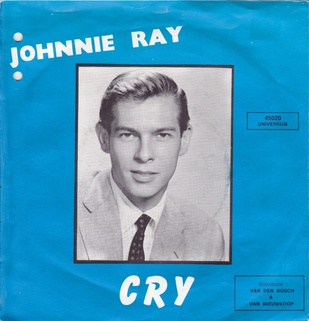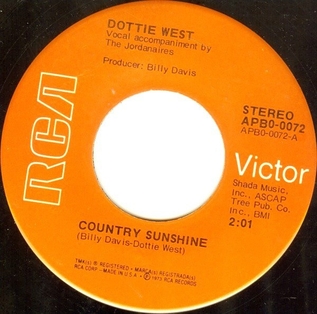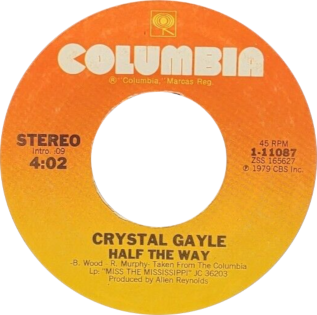Related Research Articles
Brenda Gail Webb, known professionally as Crystal Gayle is an American country music singer widely known for her 1977 hit "Don't It Make My Brown Eyes Blue". Initially, Gayle's management and record label were the same as that of her oldest sister, Loretta Lynn. Not finding success with the arrangement after several years, and with Lynn's encouragement, Gayle decided to try a different approach. She signed a new record contract and began recording with Nashville producer Allen Reynolds. Gayle's new sound was sometimes referred to as middle-of-the-road (MOR) or country pop, and was part of a bigger musical trend by many country artists of the 1970s to appeal to a wider audience. Subsequently, Gayle became one of the most successful crossover artists of the 1970s and 80s. She is known for her floor-length hair.

"Cry" is a 1951 popular song written by Churchill Kohlman. The song was first recorded by Ruth Casey on the Cadillac label. The biggest hit version was recorded in New York City by Johnnie Ray and The Four Lads on October 16, 1951. Singer Ronnie Dove also had a big hit with the song in 1966.

Heartbreaker is the twentieth solo studio album by American singer-songwriter Dolly Parton. It was released on July 17, 1978, by RCA Victor. The album was produced by Gary Klein and Parton with Charles Koppelman serving as executive producer, and was an even more direct aim at the pop charts, with several of its songs verging on disco. The album topped the Billboard Top Country Albums chart for nine consecutive weeks and peaked at number 27 on the Billboard 200. The album produced two number one hits on the Billboard Hot Country Songs chart, "Heartbreaker" and "I Really Got the Feeling", while "Baby I'm Burnin'" peaked at number 25 on the Billboard Hot 100. The album has been certified Gold in the United States and Canada.

"Don't It Make My Brown Eyes Blue" is a song written by Richard Leigh, and recorded by American country music singer Crystal Gayle. It was released in June 1977 as the first single from Gayle's album We Must Believe in Magic.

"I'll Get Over You" is a song written by Richard Leigh, and recorded by American country music artist Crystal Gayle. It was released in March 1976 as the second single from the album Somebody Loves You. The song was Gayle's seventh chart hit and her first number-one country hit in 1976.

"Country Sunshine" is a song co-written and recorded by American country music artist Dottie West. It was both a Coca-Cola ad jingle and a single. The song was co-written by West, along with Billy Davis and Dianne Whiles. Its popularity as a commercial jingle led to its single release by RCA Victor in 1973. The single became among West's commercially-successful releases, reaching the top ten of the US and Canadian country charts. It also made positions on other genre charts in both countries. "Country Sunshine" has since been considered among West's most well-known recordings.

"Drivin' My Life Away" is a song co-written and recorded by American country music artist Eddie Rabbitt. It was released in June 1980 as the first single from the album Horizon. The song was written by Rabbitt, Even Stevens and David Malloy.

"Talking in Your Sleep" is a song written by Roger Cook and Bobby Wood. The first recorded version of the song is by the band Marmalade, produced by Cook's longtime collaborator Roger Greenaway; Marmalade's version was also released as single in 1978 but failed to chart.

"Half the Way" is a song written by Ralph Murphy and Bobby Wood, and recorded by American country music artist Crystal Gayle. It was released in September 1979 as the first single from the album Miss the Mississippi.

"Only Love Can Break a Heart" is a popular song from 1962, performed by the American singer-songwriter Gene Pitney. The song was written by Hal David (words) and Burt Bacharach (music) and appears on Pitney's second album Only Love Can Break a Heart.

"I Don't Wanna Lose Your Love" is a song written by Joey Carbone and recorded by the American country music artist Crystal Gayle. It was released in February 1984 as the second single from the album Cage the Songbird. The song reached number 2 on the Billboard Hot Country Singles & Tracks chart.

"Ready for the Times to Get Better" is a song written by Allen Reynolds, and recorded by American country music artist Crystal Gayle. The song first appeared on Gayle's album Crystal in 1976 and was released as a single in January 1978. It was the fourth single from the album and Gayle's fourth number one on the U.S Billboard Hot Country Singles chart. The song spent a total of ten weeks on the chart.
"If You Ever Change Your Mind" is a song written by Parker McGee and Bob Gundry, and recorded by American country music artist Crystal Gayle. It was released in August 1980 as the first single from the album These Days. The song was Gayle's eighth number one country hit. The single stayed at number one for one week and spent a total of eighteen weeks on the chart, and also peaked at number eighteen on the Adult Contemporary chart.
"You Can't Run from Love" is a song co-written and recorded by American country music artist Eddie Rabbitt. It was released in March 1983 as the second single from the album Radio Romance. "You Can't Run from Love" was the follow-up to Rabbitt's duet with Crystal Gayle, "You and I". The song was Rabbitt's twelfth number one single on the country chart. The single went to number one for one week and spent a total of thirteen weeks on the country chart. "You Can't Run From Love" peaked at number fifty-five on the Hot 100 and number two on the Hot Adult Contemporary chart. It was written by Rabbitt, Even Stevens and David Malloy.
"'Till I Gain Control Again" is a country song written by Rodney Crowell and originally recorded by Emmylou Harris in 1975. The song was included on her 1975 studio album Elite Hotel. The song is most known by the No. 1 single version recorded by Crystal Gayle on her 1982 album, True Love.
"The Sound of Goodbye" is a song written by Hugh Prestwood, and recorded by American country music artist Crystal Gayle. It was released in October 1983 as the first single from her album Cage the Songbird. The song was Gayle's thirteenth number one country single as a solo artist. The single went to number one for one week and spent a total of fourteen weeks on the country chart.
"You Never Gave Up on Me" is a song written by Leslie Pearl, and recorded by American country music artist Crystal Gayle. It was released in February 1982 as the second single from the album Hollywood, Tennessee. The song reached number 5 on the Billboard Hot Country Singles & Tracks chart.
American country artist Crystal Gayle has released 25 studio albums, 17 compilation albums, two video albums, one live album, one soundtrack album, and has appeared on 16 additional albums. Gayle signed with United Artists Records in 1974 and began recording albums. Her self-titled debut album was issued in 1975, peaking at number 25 on the Billboard Top Country Albums chart. After releasing two similar studio albums, Gayle issued We Must Believe in Magic in 1977. Reaching number two on the country albums chart and number 12 on the Billboard 200, it became the first album by a female country artist to be certified platinum by the Recording Industry Association of America. When I Dream (1978) also peaked in the second position of the Top Country Albums survey and was certified platinum in the US. Her seventh studio album, Miss the Mississippi (1979), was issued on Columbia Records and certified gold in the United States. These Days achieved similar status in 1980. Her ninth studio album entitled Hollywood, Tennessee (1981) contained several cover versions of pop music songs. In 1983, Gayle issued her first greatest hits compilation, Crystal Gayle's Greatest Hits before leaving Columbia. The album was certified gold from the RIAA a decade later.
American country music artist Crystal Gayle has released 15 music videos and 68 singles, including six as a collaborative artist, four as a featured artist, and six promos. Gayle's debut single was 1970's "I've Cried " via Decca Records, which reached number 23 on the Billboard Hot Country Singles chart. Encouraged by her sister to develop her own musical style, Gayle signed with United Artists Records where she began recording country pop material. That year "Wrong Road Again" reached number 6 on the country chart, launching several major hits including "I'll Do It All Over Again" and her first #1 hit, "I'll Get Over You". She released "Don't It Make My Brown Eyes Blue" in 1977 which became her signature song and brought her crossover pop success. It topped the country chart, reached number 2 on the Billboard Hot 100, and became an international hit. Its success elevated her career and was followed by three more number-one country singles: "Ready for the Times to Get Better", "Why Have You Left the One You Left Me For", and the top-twenty pop hit "Talking in Your Sleep".
"Your Kisses Will" is a song written by Van Stephenson, and recorded by American country music artist Crystal Gayle. It was released in July 1979 as the first single from the album We Should Be Together. The song reached #7 on the Billboard Hot Country Singles & Tracks chart.
References
- ↑ Joel Whitburn, The Billboard Book of Top 40 Hits. 7th edn, 2000
- ↑ "Leslie Pearl". Billboard .
- ↑ Billboard Singles, Allmusic.com
- ↑ "Item Display - RPM - Library and Archives Canada". Collectionscanada.gc.ca. 1982-09-25. Retrieved 2018-09-04.
- ↑ "Folgers. "Folger's Coffee Jingle History"". Archived from the original on 2016-01-02. Retrieved 2016-01-04.